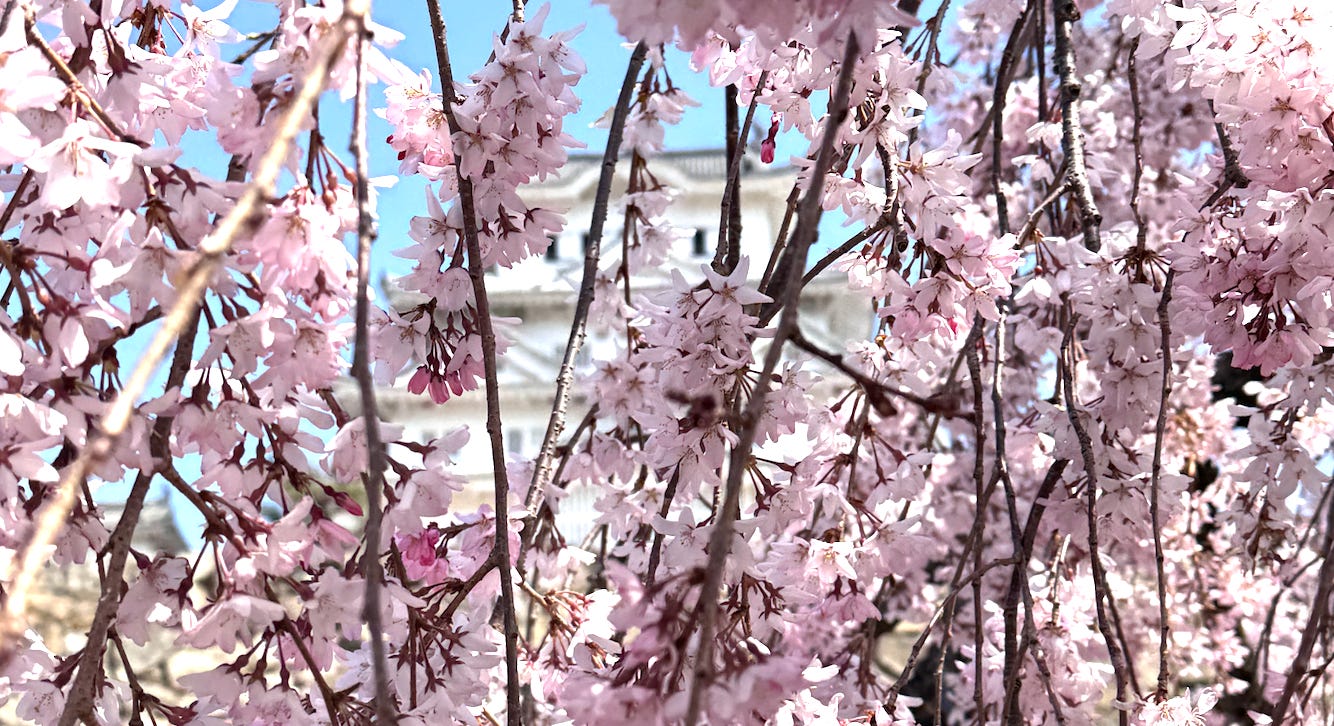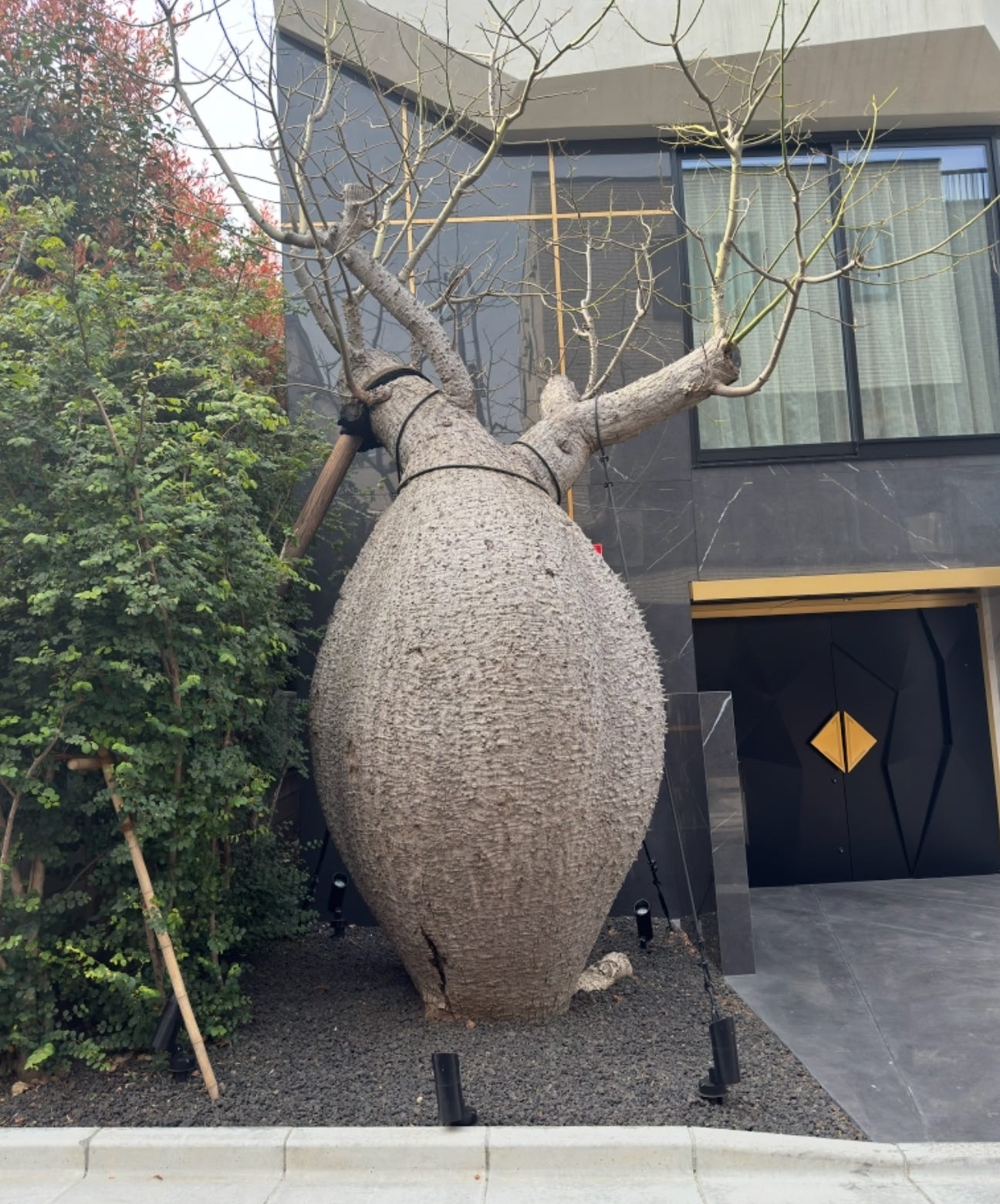Process Pending: Feb/March reading and listening roundup
The current microseason is Swallows return...
Many, many folks are being arrested and deported unjustly. Here is one to support Rümeysa Öztürk, a Tufts graduate student who wrote an op-ed.
Hello from Wakayama, Tokyo, Nagasaki, Yanagawa, and Kyoto, where parts of this newsletter were written, where the books within were read. The cherries have bloomed! The willows budding in tender greens! The weather has gone from cool to perfect. The current microseason is Swallows Return, and indeed there they are, bouncing and fluting in the mild afternoons!

All finished
Biography of X by Catherine Lacey
Woman Running in the Mountains (山を走る女) by Yūko Tsushima
Silence (沈黙) by Shūsaku Endō
Four Thousand Weeks by Oliver Burkeman
Memory of Water by Emmi Itäranta
She Who Became the Sun and He Who Drowned The World by Shelly Parker-Chan
Orlando by Virginia Woolf
Still Reading
Midnight Children by Salman Rushdie
Just Starting
Seiobo There Below by László Krasznahorkai
Modern Nature by Derek Jarmin
Of Dogs and Walls by Yūko Tsushima
Now Listening (Japan edition)
Flora by Hiroshi Yoshimura (ambient)
Get My Mojo Back by Tadataka Unno (jazz)
Hamidete! by Yeye (j-pop)
Sankpunkans by Sanpunkans (adaptations of American folk)
soraya by soraya (folk)
Both Orlando and Biography of X are fictional biographies written from the point of view of a narrator who regularly engages the reader.
Biography of X, told from the point of view of the eponymous’ artist’s widow, takes place in an alternate history, where the southern U.S. secedes after WWII to become an oppressive Christian Nation, while the North becomes a socialist-anarchist haven, and the west stays wild (??). It deals with trauma, shifting identity, abuse given and received, and also the farcity (and sometimes, genuine affect) of the Art World.
In Orlando, Woolf’s “longest love letter” to Vita Sackville-West, the eponymous character begins the story male, and then after early adulthood, falls asleep in Istanbul for a week to awaken as a woman. It is very clever, often funny enough to make me laugh out loud, full of the rich beautiful detail Woolf is famous for. It deals with gender in an extremely empathetic and nuanced way, in a way that even now feels like fantastical, given that Orlando’s gender bending and literal sex change go more or less unchallenged by all but the most formal elements of society (and even then, barely). It is very meaningful to read as a genderfluid person. It is also littered throughout with racism and racist tropes. This essay by Andrea Lawlor in Electric Lit deals well with both:
Orlando is a book from another time, and no amount of historical context will change how it is compromised by Woolf’s Orientalist preoccupation with racialized bodies, her zeal in evoking Blackness in racist terms. We don’t get past the racism that rises from these pages, that haunts this book and many others of its time. We don’t read the book in spite of it, either. If we keep reading, we read into the time, understanding that whiteness and all its violence, along with Woolf’s brilliance, her vision, her profound intimacy with the English language, are among the forces that shape this literature.
An asymmetric commentary, of sorts, can be made about X. Lacey flattens millions in the South into either religious zealots or docile followers, and without much detail (except with reverence to Emma Goldman), she turns the North into a kind of socialist-anarchist utopia (although New York City, it seems, remains unchanged).
As queer fictions and as examples of a specific form (fictional biography) published 95 years apart, these were interesting to read together, engaging significantly in identity, relationship, love, the doing of art, and spinning in loosely, cleverly, and often hilariously, in historicity with many references to people alive and dead, events famous and obscure. I’ll probably re-read Orlando someday. I’d recommend both.
I read both Woman Running in the Mountains and Silence during my hike on the Kumano Kodo Nakahechi route, picking up the latter at a used bookstore called the Japanese Wolf Museum in Hongu, Japan.
Woman Running in the Mountains is a book to read in the middle of winter because it so compellingly evokes the heat and sweat and brightness of summer. I loved it. It is perhaps the only book I have ever read where life is completely a-global, the outside world never intrudes, and this is organic and true to the main character. No references to historical events, or literature, or news, or even really the rest of the city. The main character, Takiko, gives birth to a son at the beginning of the book, becoming a single mother in 1970s Tokyo. She lives with a sick, overbearing mother, an abusive father, and her little brother in a cramped apartment, and over the course of the year begins, without seeking, to find pleasure and purpose in her life as she lives it, in her son, and in the brief and genuinely touching relationships she has with a few men. Yūko Tsushima is known for her books about single mothers; I only wish more were translated. Recommended unreservedly! I was reading it on Libby and didn’t even realize when I’d read the last page. Left bereft, I checked out a book of two of her short stories immediately.
Silence was fine. I picked it up because it was about Christianity & the Portuguese, and I’m interested in how a Japanese writer might deal with this aspect of Japan’s history: colonization attempts, violence, the successful closing of borders. In sum, Christians die horribly, god does nothing, and a Portuguese monk tries to grapple with this while also suffering, etc. There’s a lot, a lot, of discussion about what Jesus’ face might have looked like, imagining it, dreaming it, etc. The author, Shūsaku Endō, was himself a devout Catholic, so from that perspective, of keeping faith when god fails to show, it was interesting? Idk.
The rest…
Memory of Water… really needed a better understanding of how groundwater works for it to be good climate fiction. I did like the tea ceremonies, the tense class dynamics, and the possible future where China and Russia takeover Europe and change the cultural dynamics. But the lack of understandinf of hydrology & science bothered me a lot, and kept pulling me out of the story.
Four Thousand Weeks… didn’t hate it? I never read self-help books. The biggest takeway for me was: don’t spend energy on resentmet. Petered off toward the end.
She Who Became the Sun and He Who Drowned The World… very fun historical fiction set in 14th century China as the Mongololian Yuan dynasty ends. More trans/gender-bending themes, with just a little bit of magic thrown in, and really well done. Easy reads, great as audio books.
After this, a brief break from our icy programming for a 4-part series on Japan, starting with my hike on the Kumano Kodo, an ancient pilgrimage route, continuing onto a visit to the Ukichirō Nakaya Museum (my own sort of pilgrimage), and then some recommendations from Tokyo, Nagasaki, and Kyoto. Maybe also a brief history of glaciation in Japan? Let me know if you’d be interested.
Cheers,
Elizabeth




